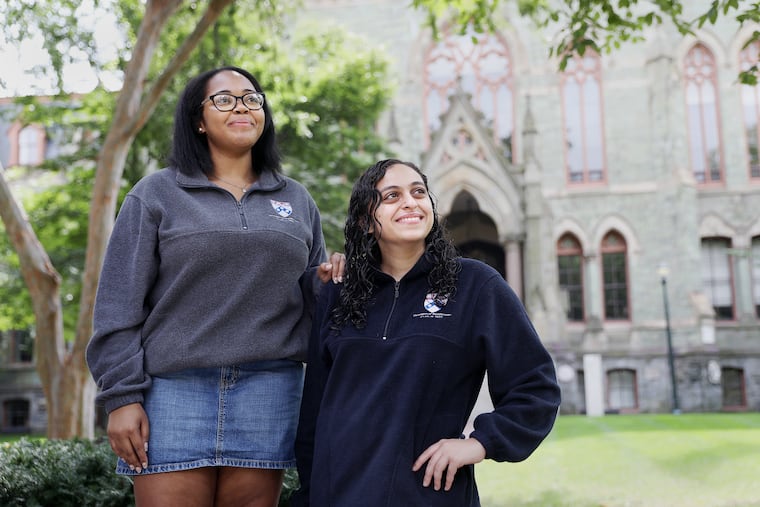Penn’s new student leaders identify as first-generation college students from lower income families
“We’re hoping we are able to take advantage of that leverage and that momentum to achieve more than any other board has ever achieved,” Owens, 21, a senior from Lexington, Tenn. said.

Mercedes Owens and Mary Sadallah, both at the University of Pennsylvania, are first-generation college students from lower-income families who hope to spend this year putting the needs of others like them front and center at the Ivy League institution.
As the newly elected president and vice president of Penn’s Undergraduate Assembly, they’ve got a good shot at having their voices heard. They hope the racial reckoning happening on college campuses since George Floyd’s death at the hands of Minneapolis police and the challenges of the pandemic, which have only exacerbated inequities, will help drive change at Penn.
“We’re hoping we are able to take advantage of that leverage and that momentum to achieve more than any other board has ever achieved,” said Owens, 21, a senior from Lexington, Tenn. “We want to improve the campus climate so that [first-generation, low-income] students are more integrated and more accepted at Penn.”
Penn has been admitting more first-generation students; the university says one in seven undergraduates are first generation and one in five are eligible for federal Pell grants, targeted to lower-income families. But students from backgrounds like Owens' and Sadallah’s have long talked about feeling like impostors among mostly middle- and upper-class students on campus.
» READ MORE: The 'impostor' syndrome of first-generation Penn students: Uneasy among privileged, distanced from family
Owens and Sadallah also represent the first team of student-elected female leaders who are students of color, said Katie Bonner, executive director of Penn’s office of student affairs. They ran unopposed and garnered 1,300 and 1,274 votes, respectively.
“It’s an awesome hallmark and milestone for the organization and also for the university at large,” said Michael Krone, a 2019 Penn graduate and former student body president.
Krone, now a business analyst in Philadelphia, said their election means voices of first-generation, low-income students will be elevated and get the ear of the university’s senior leadership. In the past, student government leaders have made a difference, Bonner said, noting that their advocacy led to an even greater focus on student wellness at Penn, following concerns about mental health support.
“It’s personal for us,” Sadallah said. “We’re able to relate to these students, and we know how hard it can be when you don’t have the kind of institutional access or voice that a lot of other groups of students have.”
The duo also have the challenge of leading the student body when fewer live on or near campus; some are in other time zones or countries. Most of Penn’s classes are being conducted remotely. Sadallah, 20, a junior philosophy, politics and economics major from Egg Harbor Township, is among the few living on campus. Owens, an economics major, lives in an off-campus apartment.
They plan to hold meetings via Zoom and circulate a monthly newsletter, holding themselves accountable for achieving their goals.
“Their leadership is representation of our greatest dream for higher education, that higher education allows for transformation of lives,” said Mamta Motwani Accapadi, Penn’s vice provost for university life. “Their wisdom, their backgrounds can inform the way they lead and serve in the community.”
Owens grew up with two younger siblings in a single-parent family, her mother a licensed practical nurse. Sadallah’s parents emigrated from Egypt before she was born and lived in Philadelphia before moving to New Jersey. Her father works as a server at an Atlantic City casino and her mother at a grocery store.
Both said living among Penn students with economic and academic privileges they didn’t have was eye-opening. Owens noted that her small, rural high school didn’t give her guidance on pursuing admission to Penn.
“It was kind of me navigating it myself," she said.
» READ MORE: Faculty, alumni pressure Penn to make payments to support Philly schools in push for ‘racial and economic justice’
They said they intend to seek more funding and better meeting space for Black student groups and other cultural groups, and push Penn to further address racial injustice. Tension emerged during the most recent student government elections when a candidate for an office withdrew after a racial slur he had used in a 2019 GroupMe account surfaced, according to the Daily Pennsylvanian.
Owens and Sadallah also pointed to Instagram accounts by students of discrimination at Ivy League universities, including Penn.
“I was walking to my dorm room in freshman year,” posted one student in the Class of 2021. "An older student stopped me and asked what I was doing in the building. He refused to believe I was going to my room.”
“We haven’t heard any response from the administration at all about these stories,” Owens said.
They said they will push Penn to make payments in lieu of taxes to the city to help the local public schools, something Penn has resisted, noting it contributes in other ways, and lobby for a town hall meeting on climate change.
They also said Penn’s communication to students during the pandemic has been lacking. Even now, they question whether the university’s testing protocols are enough to protect the surrounding West Philadelphia community.
“That’s a community of a lot of Black and brown people who may already be at risk for the coronavirus,” Sadallah said.